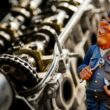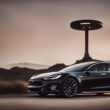Contents Show
At the end of September the question arises again as to which party should be checked. With his decision, the voter can also set the course for the Mobility of tomorrow.
When the ballot boxes open on September 26th, Germany will also decide on the future of its mobility. The debates about this important social issue are currently mainly from Climate change and the reduction of CO2 emissions. Actually, all parties are relying on e-mobility in their election manifesto to solve the problem. However, in the strategies and schedules towards a climate-friendly realignment of our mobility, there are in part clear differences in the party programs. This also applies to questions about road safety, autonomous driving, cycling and the future of public transport. Here, too, there are very different focuses and approaches to shaping our mobility before tomorrow.
CDU
The Chancellor Party wants to carry out the change in mobility with a sense of proportion, especially with regard to the German auto industry. The best cars in the world should continue to come from Germany, including those with electric drives. The future belongs to e-mobility, but other forms of drive should not be ruled out. The Union is not planning to ban diesel or combustion engines. Cars with internal combustion engines should become climate-friendly with the help of synthetic fuels and remain sustainable. E-mobility is to be promoted, among other things, with more public and solar-powered charging stations. Hydrogen also plays a role in the Union's plans, but primarily in the transport sector.
The Union parties are also planning high investments in the rail network in order to get more goods off the road in the future. The Union does not want to introduce speed limits. In order to reduce traffic jams on the highways, innovative traffic control systems are being considered as a solution. In addition, automated driving functions are to be introduced. The Union parties want to strengthen and digitize public transport, and the national cycling plan is to be vigorously implemented and further developed.
SPD
The SPD has set itself the speed limit: 130 km / h should be the limit. The conversion to e-mobility is to be actively promoted with generous financial support, which at the same time should help the domestic auto industry to secure its leading role in the world and thus jobs in this country. The development of a circular economy is also being considered, which could create new jobs by recycling batteries, for example. Around a third of the German vehicle population, and thus a good 15 million units, should be electric by 2030. A comprehensive charging infrastructure is to be created accordingly. The long-term goal is climate-neutral mobility for everyone.
In addition, local and bicycle traffic are to be strongly promoted and their areas expanded. The aim is to guarantee mobility for every citizen with a connection to local public transport. Among other things, the Social Democrats want to support models such as the 365-euro ticket. At the beginning of the new decade, Germany should offer the most modern and climate-friendly transport system in Europe.
The green
The Greens are also calling for new speed limits, which, in addition to a limitation on motorways to 130 km / h (120 km / in metropolitan areas), also provide for speed 30 as the rule and speed 50 as an exception in urban areas. This is also part of a vision of road traffic with no fatalities or serious injuries. The Greens also want to strengthen local public transport and its networks with the aim of guaranteeing mobility for everyone. Pay-as-you-go financing, similar to the principle of broadcasting contributions, is intended to enable low prices even with supra-regional use, according to the election program.
The aim is to double the number of passengers in public transport by the new decade. The number of cycle paths is also expected to double during this period. Above all, commuter routes from the surrounding area to the cities are to be promoted. Vision is a complete network of cycle paths. With a reform of the road traffic law in favor of cyclists, Germany is to become a cycling country.
The Greens see the combustion engine as an obsolete model, the end of which the environmental party wants to initiate with a ban on the sale of such new vehicles from 2030. In addition, e-cars should become cheaper, while CO2-emitting cars should become more expensive. The current diesel subsidies and company car taxation are to be reformed. The number of e-cars on German roads is expected to be well over 2030 million by 15.
The election manifesto of the left
The left want to set speed limits even more sharply than the Greens. They demand a general limit of 120 km / h on the autobahn, 80 km / h on country roads and 30 km / h in urban areas. Inner cities should be as car-free as possible, which creates more space for bicycle traffic. Public transport is to be given priority over private transport and local transport is initially cheap with 365-euro tickets and later even basically free of charge. Here, too, a guarantee of mobility is required for rural areas in order to be able to reach urban centers. Citizen buses and shared call taxis are intended to support this.
From 2030 onwards, the internal combustion engine will say goodbye, even if the left will do so. Even an end to conventional fuels is being targeted, and subsidies for diesel and company cars are also to come to an end. The left also calls for a socio-ecological restructuring of the auto industry.
FDP
Speed limits? Driving bans? Nothing. The Liberals want individual transport without restrictions. Intelligent concepts are to be developed for better traffic control. In addition, they want to create new legal requirements and thus the framework for the intensive use of autonomous cars, air taxis or hyperloop railways, according to the election program. An expansion of the rail network is planned, which is also to be privatized. Cycle traffic is also to be promoted with higher investments in the traffic infrastructure, but in order to avoid conflicts with motorized traffic.
The FDP advocates a technology-open car future, which above all should help secure the future viability of the car industry. The end of the burner is not an issue. Instead, purchase premiums for e-cars are to be dropped, and the EU's stricter CO2 limits are to be scrutinized. E-mobility should nevertheless be promoted, for example with the expansion of a nationwide charging infrastructure.
AFD
The AFD wants to strengthen Germany's status as a car country. Instead of setting new speed limits, existing ones should be checked and possibly even lifted. The election program also states that motorized individual transport should be promoted through more parking space and more roads. The auto industry should also be supported in its central role and its jobs should be preserved. The combustion engine should continue to play an important role in technology-open legislation with the help of synthetic fuels. Unilateral promotion of e-mobility and thus discrimination against other modes of transport such as diesel vehicles is rejected. The party is against "unrealistic" CO2 targets of the EU and against motorcycle bans.
The party program does not attach any importance to the bicycle. Public transport is also given little consideration. However, the rail traffic is to be renovated and expanded.




